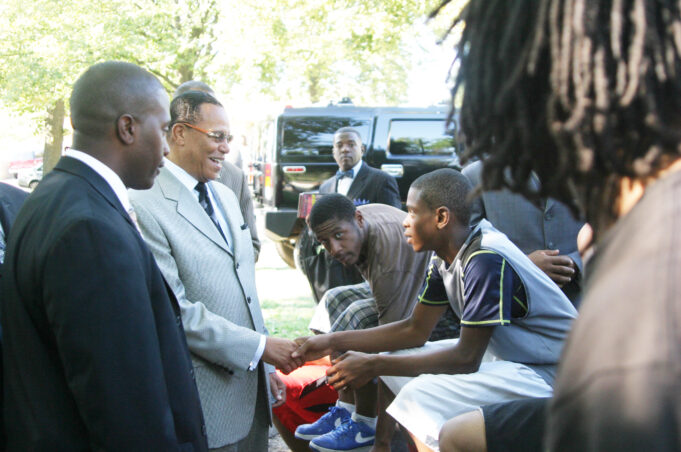Surviving in America is very difficult for Black male youth, with or without a father, though those without may face greater difficulties on their journey to manhood. Black fathers, activists, faith-based organizations, and national and local non-profits, and Black fraternities who step up daily to fill in the gap say fulfilling the needs of Black boys and youth say, it’s not rocket science.
“They need love. And it’s about us not having that fear to love them, and meet them where they are,” said Marcus Glenn, area manager for the Black United Fund of Texas, a community-based organization that works to enrich the lives of Black and underserved people.“If they have never felt love, how can they, in turn, express it?” he told The Final Call.
Truth and honesty are key elements to help Black boys and youth become productive citizens and meet their goals, he said. But what does love look like to a young boy whose father, for whatever reason, isn’t in the home and who’s experiencing various difficulties, at school, on the streets or at home?

From that standpoint, it’s being there to hear their problems, not judging, and then helping them think things through to find a workable solution for their lives, explained Mr. Glenn. “We can’t have a one size fits all solution, because everybody doesn’t have the same problem.
He noted, whether it is listening to them on a phone call, taking them fishing, or playing basketball with them, it’s about allowing young people to open up first because they first need to trust that people are there without any ulterior motive, said Mr. Glenn, a 39-year-old father of two. “It’s just being there to support them in a productive way,” he stated.
Mr. Glenn encourages anyone looking to mentor young Black boys and men to do it!
Black men are needed and the impact they can have can outweigh the time they spend with the young man, just teaching them things needed for manhood or to be an adult, for example, he stated.
“I would encourage people not to be afraid of our youth but see how you can help … and find somebody who’s already been doing the work. Don’t try to go in by yourself thinking you have the solution, that way, your lift is much lighter,” offered Mr. Glenn.
His “lift” was lightened by Deric Muhammad, a Houston, Texas-based activist who works to empower fathers and young men. His “Smart’n Up” Black Male Summit, the community-based motivational and educational summit designed to address the unique needs of Black men and boys, took place on June 3.
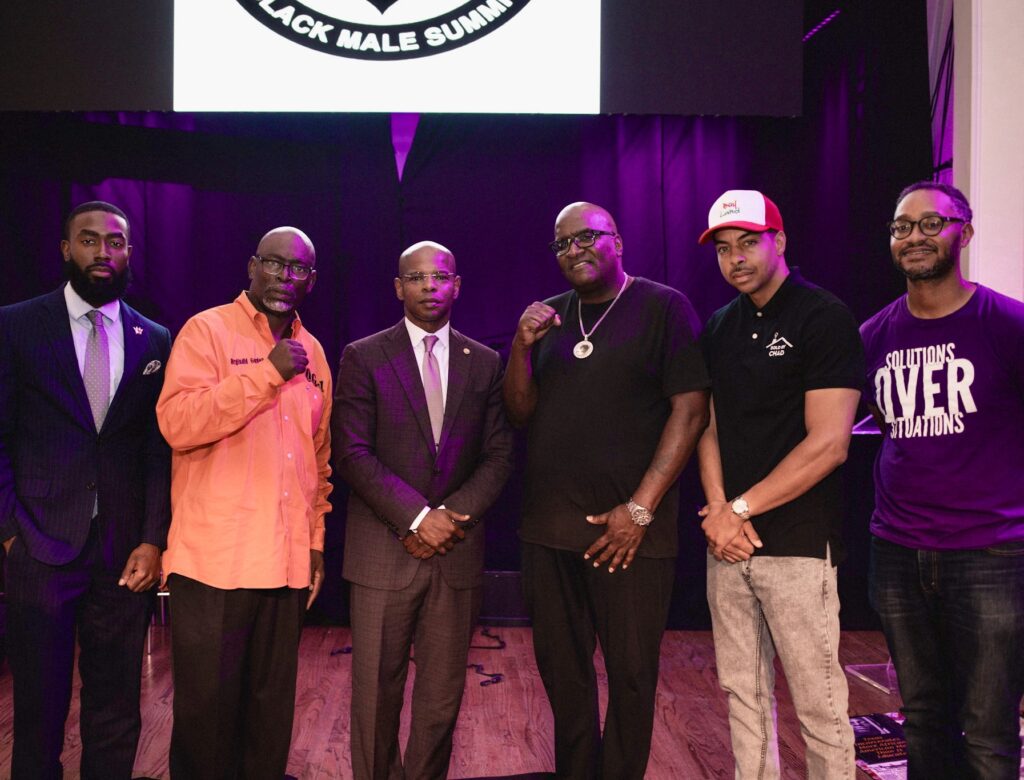
It exposes young Black males to empowering information, positive role models, potential mentors and critical resources to help them survive and succeed in an adverse society. No subject matter is sugar-coated, and their message is strong, according to organizers.
Workshops include presentations about entrepreneurship, building confidence, stopping the violence and other critical topics, targeting ages 12 and up. At the recent summit, Mr. Glenn presented on agriculture.
The motivation for Deric Muhammad becoming a mentor was internal in feeling the pain of what it’s like to grow up without his own father. He understands the challenges that young men go through, having to navigate life and being a Black male in America without an instruction manual and father in the home, the author/activist told The Final Call.
The “Smart’n Up” Black Male Summit, which convenes twice a year in Houston, was inspired and is an extension of the Million Man March, according to Deric Muhammad. That day, October 16, 1995—in which the Honorable Minister Louis Farrakhan of the Nation of Islam called nearly two million Black men to Washington, D.C.—was the greatest day of his life, he stated. He never thought that in his lifetime, he would see a day when the spirit of upliftment for Black men would be so prominent.
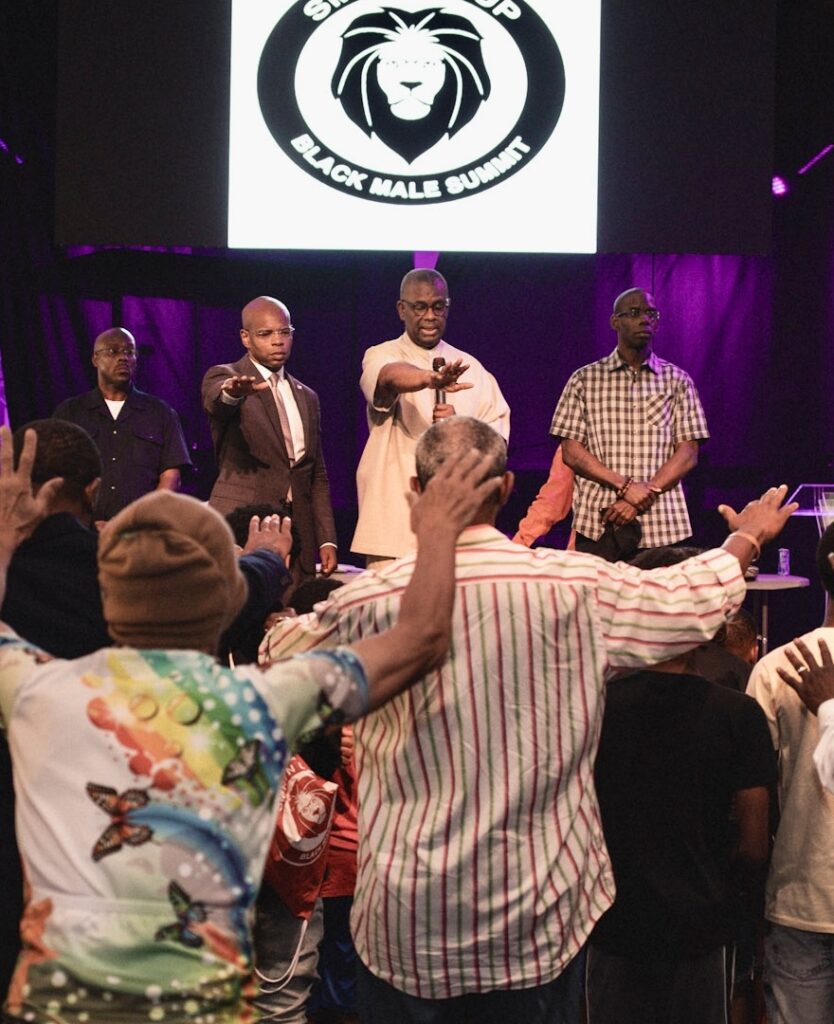
“That day was so important to me that I believe it put something in me to want to always do something where the focus is on Black men and boys,” continued Deric Muhammad.
A memorable moment of his involves a mentee he met in high school. The child’s mother reached out because he was skipping school, facing truant officers, and going down the wrong path, according to the activist.
“That mentee just graduated from high school and is on his way to trade school. So, celebrating wins like that are very monumental, that means a lot to me,” he stated. In addition, he shared, one of the speakers during the 2023 “Smart’n Up” Black Male Summit started attending when he was a freshman in college. He spoke about how it inspired him as a young Black man.
“He’s now an attorney, just having graduated from law school. We have so many success stories that I couldn’t even begin to narrate all of them, but this is what keeps us going, the work that we do for everyday people,” Deric Muhammad stated.
This year’s summit made a great impact, particularly on its teen attendees, like Jamal and Jamie, who shared their testimony on video. “I loved the event! I think it’s powerful and people like me need it, because I’ve been going through a lot of things, especially, and this really helped me,” said Jamal.
“I really loved the event and there were a lot of things I never knew about. It was a lot of fun. You’re going to love it,” stated Jamie. He especially liked the audience participation aspects of the gathering.
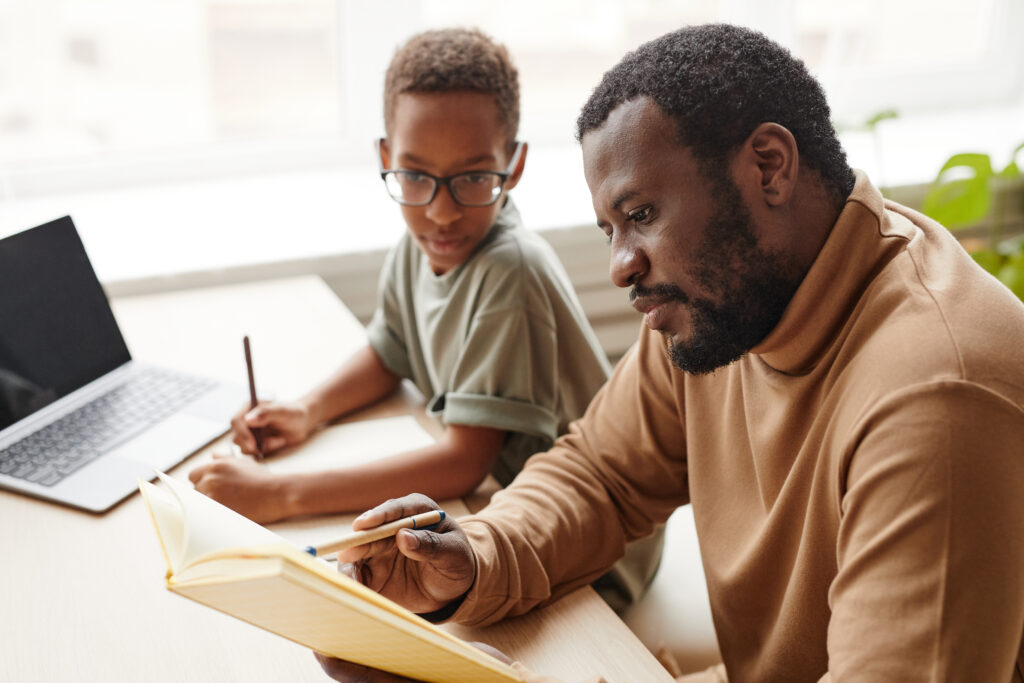
“The Smart’n Up Black Male Summit was very overwhelming in regards to the material that I received … I gained so much information and how I could utilize it, from the agriculture standpoint to how I can help my brother stay out of jail and how I can help reform my community, ” said 24-year-old Ismael Muhammad. “It was just so overwhelming to the point where I know I’ve got to go put in work and do something to help my community,” he added.
Loved and recognized for his fearless and faithful work with not just young Black men, but mothers of those victims of violence in communities across the country, is Nation of Islam Student Minister Abdul Malik Sayyid Muhammad.
For 25 years, he has demonstrated a love, commitment, and dedication to Black and oppressed youth in Los Angeles and before that, he labored in Atlanta’s communities, including cadres of young college students.
Student Minister Muhammad has made an amazing impact, said Skipp Townsend, co-founder of 2nd Call gang intervention efforts in Los Angeles. He met Student Minister Muhammad in 2006.
According to Mr. Townsend, when he became involved in gang intervention work, he sought council from the Nation of Islam student minister on how to deal with difficulties and roadblocks.
“He looked me firmly in my face and told me the more powerful you become, the more powerful your enemy will become, so don’t check them. Check yourself! See if you’re really ready to be in this work,” recalled Mr. Townsend on the advice he received. “To me, that was a father figure right there! That was really like a grandfather,” said Mr. Townsend.
The conversation was so impactful that it made him humble to the point of learning how to be more understanding, whether people understood him or not, Mr. Townsend continued. He was able to tolerate more, he said.

“I think those were the best words of wisdom I’d ever gotten and they came early in my career. … I’m truly grateful to God that he was placed in our community to guide us and give us that leadership.
Lessons he learned from Student Minister Sayyid Muhammad and other great men in this community have helped him to go on and become an effective community leader and advocate, especially to youth in gang intervention, and in education, said Mr. Townsend. For example, in addition to safe passage programs, 2nd Call ambassadors work as trade job coordinators for the formerly incarcerated, young and old, ex-Crips and Bloods.
He also explained that it is important to be accessible to young people. “We’re in schools, doing ‘push and support.’ It’s where we have a list of individuals who if they don’t have our push and support, they won’t make it. They won’t graduate this year or get their credits,” said Mr. Townsend. His ambassadors work in the schools and attend to students during those hours, helping them get to classes, do their homework, and avoid distractions, he said.
For Student Minister Muhammad, he attributes what he’s learned about manhood and giving back to the Teachings of the Most Honorable Elijah Muhammad and witnessing the work and example of the Honorable Minister Louis Farrakhan.
“We’re living at a time where the Black male is being decimated. On top of that, even the idea of a masculine revolutionary Black male is totally being eroded, so we’re being dumbed down, as the Honorable Minister Louis Farrakhan has said to us, and I think the word is ‘de-emasculated,’” said Student Minister Abdul Malik Sayyid Muhammad.
When he grew up, the African proverb “It takes a village to raise a child” was still a reality, so he had the local boys’ club with strong male figures who tended to some of his fatherly needs. But the system of integration forced strong males—particularly strong Black males—out of the household. It left many communities vulnerable, poor, and less educated, which lead to an implosion, he said.
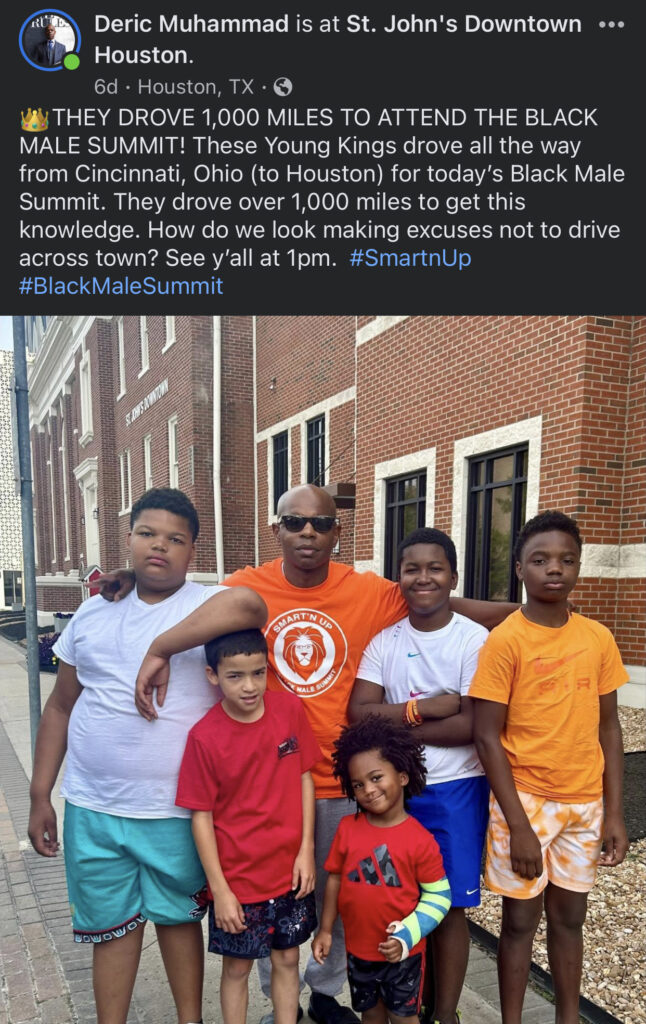
The end results make the Teachings of the Nation of Islam brought by Allah (God) in the Person of Master Fard Muhammad, the Great Mahdi, and the special classes He established for both men and women so necessary. The Teachings reverse the spiritual and mental sting heaped upon Black males, rendering them weak, explained Student Minister Muhammad.
“In my humble judgment, in these years, the 2000s, the only strong Black male figures training, and teaching are in the Nation of Islam under the Teachings of the Honorable Elijah Muhammad and that Teaching makes us attractive,” he stated.
“This is what we’re taught and this is why Allah (God) has blessed me to be attractive to other men because I’ve studied a man and the man who became my spiritual father, my mentor, is the Honorable Minister Louis Farrakhan. It is being taught by him that has put a moral board in my back and pushed me away from drugs and things I was doing to destroy the community,” he added.
In a message to young men he delivered titled, “Let Us Make Man: Uplifting Our Black and Hispanic Young Men,” in 2016 at the second annual Boys to Men Empowerment Conference in Chicago, Minister Farrakhan explained the importance of “knowing who you are,” and “your connection to God.”
But, how can one know their connection to God if they are covered in a veil of ignorance, the Minister questioned. It is important to gain the necessary knowledge that teaches young Black and Brown men how to tap into and use their powers and to become effective producers in and for their communities, he explained.
“Let’s make a real Black man, Brown man, Red man. Then never again will you have to call the White man ‘The Man,’ you will be the man, in your house; the man in your community. And we, (the elders and the youth), as young men: Let’s take our own community over and make it a safe and decent place to live,” said Minister Farrakhan.












